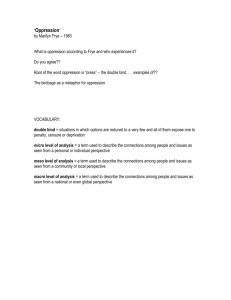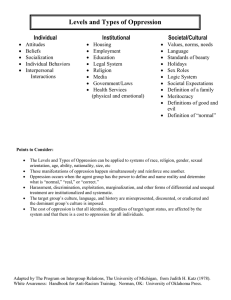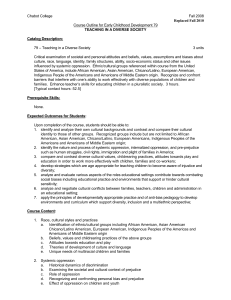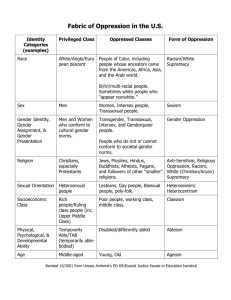Professor Isidro D. Ortiz Office phone: (619) 594-1256
advertisement
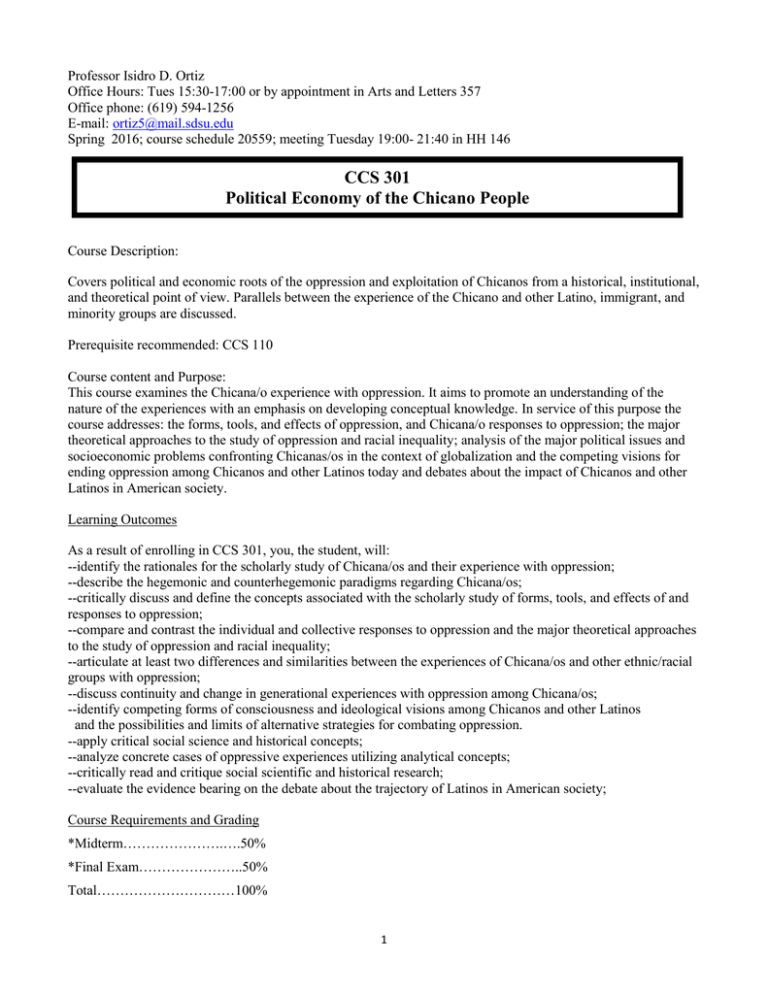
Professor Isidro D. Ortiz Office Hours: Tues 15:30-17:00 or by appointment in Arts and Letters 357 Office phone: (619) 594-1256 E-mail: ortiz5@mail.sdsu.edu Spring 2016; course schedule 20559; meeting Tuesday 19:00- 21:40 in HH 146 CCS 301 Political Economy of the Chicano People Course Description: Covers political and economic roots of the oppression and exploitation of Chicanos from a historical, institutional, and theoretical point of view. Parallels between the experience of the Chicano and other Latino, immigrant, and minority groups are discussed. Prerequisite recommended: CCS 110 Course content and Purpose: This course examines the Chicana/o experience with oppression. It aims to promote an understanding of the nature of the experiences with an emphasis on developing conceptual knowledge. In service of this purpose the course addresses: the forms, tools, and effects of oppression, and Chicana/o responses to oppression; the major theoretical approaches to the study of oppression and racial inequality; analysis of the major political issues and socioeconomic problems confronting Chicanas/os in the context of globalization and the competing visions for ending oppression among Chicanos and other Latinos today and debates about the impact of Chicanos and other Latinos in American society. Learning Outcomes As a result of enrolling in CCS 301, you, the student, will: --identify the rationales for the scholarly study of Chicana/os and their experience with oppression; --describe the hegemonic and counterhegemonic paradigms regarding Chicana/os; --critically discuss and define the concepts associated with the scholarly study of forms, tools, and effects of and responses to oppression; --compare and contrast the individual and collective responses to oppression and the major theoretical approaches to the study of oppression and racial inequality; --articulate at least two differences and similarities between the experiences of Chicana/os and other ethnic/racial groups with oppression; --discuss continuity and change in generational experiences with oppression among Chicana/os; --identify competing forms of consciousness and ideological visions among Chicanos and other Latinos and the possibilities and limits of alternative strategies for combating oppression. --apply critical social science and historical concepts; --analyze concrete cases of oppressive experiences utilizing analytical concepts; --critically read and critique social scientific and historical research; --evaluate the evidence bearing on the debate about the trajectory of Latinos in American society; Course Requirements and Grading *Midterm………………….….50% *Final Exam…………………..50% Total…………………………100% 1 *Both exams will be in short answer and essay format and be take home exams. The midterm exam will be provided in class during week eight of the semester, October 13, and is to be returned at the following class meeting, October 20; the final exam will be provided at the last class meeting, December 8, and is to be submitted on the date of the officially scheduled final exam period for the course, Tuesday, December 15; the emphasis in class is on the development and application of conceptual knowledge; the exams call for a demonstration of the understanding of concepts studied and analytical abilities. Examples of potential exam items will be provided prior to mid-term and final exams; the readings for which students will be responsible for each exam will also be specified prior to examination dates. Texts 1. Tomas Almaguer, Racial Fault Lines: The Making of White Supremacy in California (Berkeley: University of California Press, 1998) 2. Andrew L. Barlow, Between Fear and Hope: Globalization and Race in the United States (Lanham: Rowman and Littlefield, 2003). 3. Edward Escobar, Race, Police, and The Making of a Political Identity (Berkeley: University of California Press, 1995). 4. Ian F. Haney Lopez, Racism on Trial: The Chicano Fight for Justice (Cambridge: The Belknap Press, 2003). 5. Jorge Mariscal, Brown-eyed Children of the Sun (Albuquerque: University of New Mexico Press, 2006). 6. Victor Rios, Punished, Policing the Lives of Black and Latino Boys (New York University Press, 2012). The texts are available at Aztec Shops and KB books; all are available in new and used versions; renting texts is recommended unless student is a CCS major in which case student may desire to retain texts as part of the development of personal library appropriate to major. As feasible, the books will be placed on reserve in the library and be available in accordance with library policies. Structure The course will begin with a discussion of the rationales for the scholarly study of the Chicana/o experiences with oppression in the context of globalization and its racial consequences and in the ‘Hispanic moment”. This examination will be followed by a discussion of the hegemonic and counter-hegemonic paradigms regarding Chicana/os. This theoretical discussion will be succeeded by an examination of analysis of the concept of oppression and related concepts and of theories regarding ethnic experience and socio-economic and political development. Upon the completion of this examination, a systemic assessment of the historical experience of the generations of the Chicano population with oppression and the forces shaping the status and experience will be conducted, drawing upon the theoretical discussion. An examination of the similarities and differences in the contemporary status and problems of Chicanos and other Latinos and the forces shaping the current status will succeed this examination. An analysis of the strategies used in the past and today to deal with the problems will then be undertaken in order to assess their possibilities and limits in the context of globalization. Lastly, we will examine and discuss the current visions for ending oppression and the public debate regarding the trajectory of Chicanos and other Latinos and its implications for the United States as articulated by scholars and others. Readings pertinent to these foci will serve as a basis of class discussions and supplement the lectures. The lectures will be complemented with audiovisual materials on specific aspects of the Chicano experience. CCS meets requirements for the CCS major and for the “GE “Human Experience” requirement. Consideration of different levels of preparation needs and interests is given in course to accommodate the diversity of preparation, needs and interests. The expectation is that student s will be academically engaged, i.e., invest time and energy in activities that will enable them to meet the level of rigor and challenge in the course and succeed; previous students have done well in the course with gpa in the range of 3.0-3.3 with vigorous engagement; 2 Schedule and Readings 1/ 26 Introduction and Overview Andrew Barlow, Between Fear and Hope, chaps. 1 & 2. William I. Robinson, “The Global Economy and the Latino Populations in the United States: A World Systems Approach,” Critical Sociology, 1992, 19(2), pp. 29-59. Mario Barrera and William Robinson, “Global Capitalism and Twenty-first Century Fascism: A U.S. Case Study,” Race & Class, 2012, 53(3), pp. 4-29. 2/2 Chicanas and Chicanos: Hegemonic and Counterhegemonic Paradigms Andrew Barlow, Between Fear and Hope, chaps. 3-5. Raymond Rocco, “The Structuring of Latino Politics: Neo-liberalism and Incorporation,” NACLA Report on the Americas, Nov. 1, 2010. Ronald Takaki, A Different Mirror, chap. 6, “Emigrants from Erin.” 2/9 Theories of Inequality and Oppression Iris Young, “Five Faces of Oppression” in D. Harris, Multiculturalism from the Margins. Mario Barrera, “A Theory of Inequality” in, eds. Antonia Darder, Rodolfo Torres, and Henry Gutierrez, Latinos and Education: A Critical Reader, pp. 33-44. Eduardo Bonilla Silva and David Dietrich, The Sweet Enchantment of Color-Blind Racism in Obamerica,” The Annals of the American Academy of Political and Social Science, March 2011; 2/16 Generational Experiences with Oppression: The Original Chicanos Tomas Almaguer, Racial Fault Lines: The Historical Origins of White Supremacy in California. Alberto Camarillo, Chicanos in a Changing Society, chaps. 1-5. Mario Barrera, Race and Class in the Southwest, chap. 3: “The Establishment of a Colonial Labor System.” 2/23 Generational Experiences with Oppression: The Mexican-Immigrant Generation Edward Escobar, Race, Police, and the Making of a Political Identity. 3/1 Generational Experiences with Oppression: The Mexican-American Generation Mario T. Garcia, Mexican Americans: Leadership, Ideology, and Identity, chaps. 4 & 6. Ignacio Garcia, Viva Kennedy: Mexican Americans in Search of Camelot, chaps. 1-4. 3/8 Generational Experiences with Oppression: The Chicano Generation Ira F. Haney, Racism on Trial: The Chicano Fight for Justice. 3/15 The Chicano Generation (cont’d) Jorge Mariscal, Brown-eyed Children of the Sun. 3/22 Generational Experiences with Oppression: The Post-Chicano Generations Victor Rios, Punished, Policing the Lives of Black and Latino Boys. 3/29 Spring Break 4/5 Michael Males, Scapegoat Generation, chaps. 1 & 2. Hector Cordero Guzman, “The Structure of Inequality and the Status of Puerto Rican Youth in the United States,” Centro de Estudios Puertoriqueños Journal. Victor Rios, Punished. 4/12 The Post-Chicano Generations (cont’d) George Lipsitz, “We Know What Time It Is: Youth Culture in the 90’s,” Centro de Estudios Puertoriqueños Journal. Francisco Villareal et al., “Donde está la Justicia? A Call to Action on behalf of Latina and Latino Youth in the U.S. Justice System,” Institute for Children, Youth and Families, Michigan State University. Kevin Terry, “Community Dreams and Nightmares: Arizona, Ethnic Studies,” NYU Law Review 2013. 3 Arely Zimmerman, “A Dream Detained: Undocumented Latino youth and the Dreamer Movement,” NACLA Report on the Americas, Nov. 1, 2011. Zachary Levenson,”Occupy Education: the Student Fight Against Austerity in California,” NACLA Report on the Americas, Nov. 1, 2011. 4/19 Contemporary Strategies, Limits, and Possibilities: Electoral Politics and Interest Group Politics Paula Cruz Takash, “Breaking Barriers to Representation: Chicana Elected Officials in California,” in C. Cohen et al., Women Transforming Politics. Guadalupe San Miguel, Actors Not Victims: Chicanas/os in the Struggle for Educational Equity,” in Crossroads, eds., Maciel and Ortiz. 4/26 Contemporary Strategies: The Strategies of Community Organizing and Protest William V. Flores, “Mujeres en Huelga: Cultural Citizenship and Gender Empowerment in a Cannery Strike,” in W.V. Flores and R. Benmayor, Latino Cultural Citizenship: Claiming Identity, Space and Rights, pp. 210-254. Andrea Guerrero, Silence at Boalt Hall. William I. Robinson, “Aqui estamos y no nos Vamos! Global Capital and Immigrant Rights,” Race & Class, 2006, 48(2), pp. 77-91. 5/3 Competing Visions and the Debate over the Trajectory of Chicana/os and Latinos Samuel Huntington, “The Hispanic Challenge,” Foreign Policy, October 28, 2009; Jack Citrin, et al., “Testing Huntington: Is Hispanic Immigration a Threat to American Identity?” Perspectives on Politics, March 2007. Marcelo Suarez-Orozco, “Everything You Wanted to Know About Assimilation But Were Afraid to Ask,” in Engaging Cultural Differences: The Multicultural Challenge In Liberal Democracies, ed., Richard Schweder, et al. (New York: Russell Sage Foundation, 2002), pp. 19-42. Hazel Rose Markus, Claude Steele, and Dorothy Steele, “Color Blindness as A Barrier to Inclusion: Assimilation and Non-immigrant Minorities,” in Engaging Cultural Differences, pp. 453-472. CCS 301 is an Explorations course in Social and Behavioral Sciences. Completing this course will help you learn to do the following with greater depth: (1) explore and recognize basic terms, concepts, and domains of the social and behavioral sciences; (2) comprehend diverse theories and methods of the social and behavioral sciences; (3) identify human behavioral patterns across space and time and discuss their interrelatedness and distinctiveness; and (4) enhance your understanding of the social world through application of conceptual frameworks from the social and behavioral sciences to first-hand engagement with contemporary issues. Contact information: I may be contacted in person before or after class, by phone and email, with the latter being the most effective outside of class time; I am also available during office hours at scheduled time or by appointment. 4
